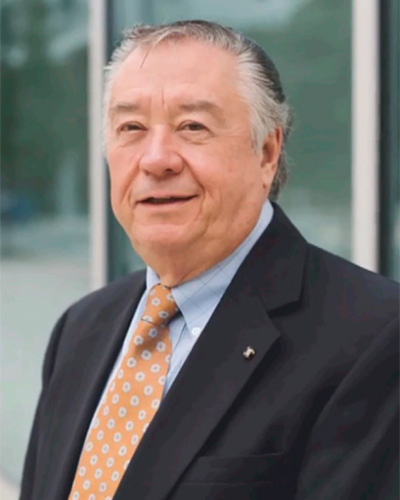In memoriam: Marc G. Caron
The field of biology lost a pioneer at the frontier of G-protein coupled receptor research a year ago, when Marc G. Caron, a 45-year professor of cell biology and neurobiology at Duke University Medical Center, died April 25, 2022. He was 75.

Caron was born July 26, 1946. The eldest of seven children, he was raised on a dairy and maple syrup farm in the village of St-Cyrille de L’islet, Quebec. He completed undergraduate studies at Laval University, Quebec, in 1969 and then earned a Ph.D. in biochemistry from the University of Miami in 1973. He conducted his postdoctoral training at Duke University Medical Center, and then began his independent career in 1975 at Laval University. After two years, he returned to Duke, where he became a full professor and spent the rest of his career.
Caron is remembered at Duke for saying “yes,” according to a remembrance in the journal Neuropsychopharmacology, always agreeing to requests to contribute to his department. He taught one of the most popular graduate school courses (in cellular signaling) for many years.
In the lab, Caron worked in two main biological areas: G protein-coupled receptors, or GPCRs, and neurotransmitter transporters. He developed early techniques for GPCR purification and visualization, then moved into studying accessory proteins that modulate receptor function. He helped discover how receptor signaling is regulated by kinases and arrestins, and identified one of the first examples of GPCR signaling mediated by a G protein rather than arrestin.
More recently, Caron’s lab studied the mechanisms of action and regulation of hormones and neurotransmitters for conditions such as schizophrenia, Parkinson's disease, attention-deficit hyperactivity disorder, mood disorders and addiction. He connected his two areas of research when his lab pivoted to study selective signaling, using allosteric modulators to activate certain signaling outcomes while blocking others.
Caron was a Howard Hughes Medical Institute investigator from 1992 to 2004, a member of the American Academy of Arts and Sciences, a fellow of the American Association for the Advancement of Science and a member of numerous scientific societies. He received the Julius Axelrod Award in Pharmacology in 2005 and the Goodman and Gilman Award in Receptor Pharmacology in 2018, both from the American Society for Pharmacology and Experimental Therapeutics, and was named an ASPET fellow in 2020. The Brain and Behavior Research Foundation awarded him the 2013 Lieber Prize for Outstanding Achievement in Schizophrenia Research.
With his wife, Pauline, Caron settled in Hillsborough, North Carolina, where he said the forests reminded him of Canada. His daughter, Kathleen M. Caron, wrote in a remembrance in the journal Neuron that Caron’s “daily nurturing” of the trees was echoed in the lab, where he tenderly mentored his students and their projects. He took great care of his new postdocs, she said, inviting them to stay with the family as they adjusted to the university.
Kafui Dzirasa, an M.D./Ph.D. graduate and later professor at Duke, recalled in the same remembrance how Caron supported his career, from joining his thesis committee to helping him open his own lab. “He didn’t want anyone to ruin the little sapling that he had spent so much time nurturing,” Dzirasa wrote.
Pauline Caron died in 2018. Marc Caron is survived by daughters, Kathleen Caron and Melissa Caron Grahn, and son, Nelson Caron; a brother and four sisters; and many grandchildren.
Enjoy reading ASBMB Today?
Become a member to receive the print edition four times a year and the digital edition monthly.
Learn moreGet the latest from ASBMB Today
Enter your email address, and we’ll send you a weekly email with recent articles, interviews and more.
Latest in People
People highlights or most popular articles

2026 ASBMB election results
Meet the new Council members and Nominating Committee member.

Simcox wins SACNAS mentorship award
She was recognized for her sustained excellence in mentorship and was honored at SACNAS’ 2025 National Conference.

From humble beginnings to unlocking lysosomal secrets
Monther Abu–Remaileh will receive the ASBMB’s 2026 Walter A. Shaw Young Investigator Award in Lipid Research at the ASBMB Annual Meeting, March 7-10 in Washington, D.C.

Chemistry meets biology to thwart parasites
Margaret Phillips will receive the Alice and C. C. Wang Award in Molecular Parasitology at the ASBMB Annual Meeting, March 7-10 in Washington, D.C.

ASBMB announces 2026 JBC/Tabor awardees
The seven awardees are first authors of outstanding papers published in 2025 in the Journal of Biological Chemistry.

Decoding how bacteria flip host’s molecular switches
Kim Orth will receive the Earl and Thressa Stadtman Distinguished Scientists Award at the ASBMB Annual Meeting, March 7–10, just outside of Washington, D.C.

